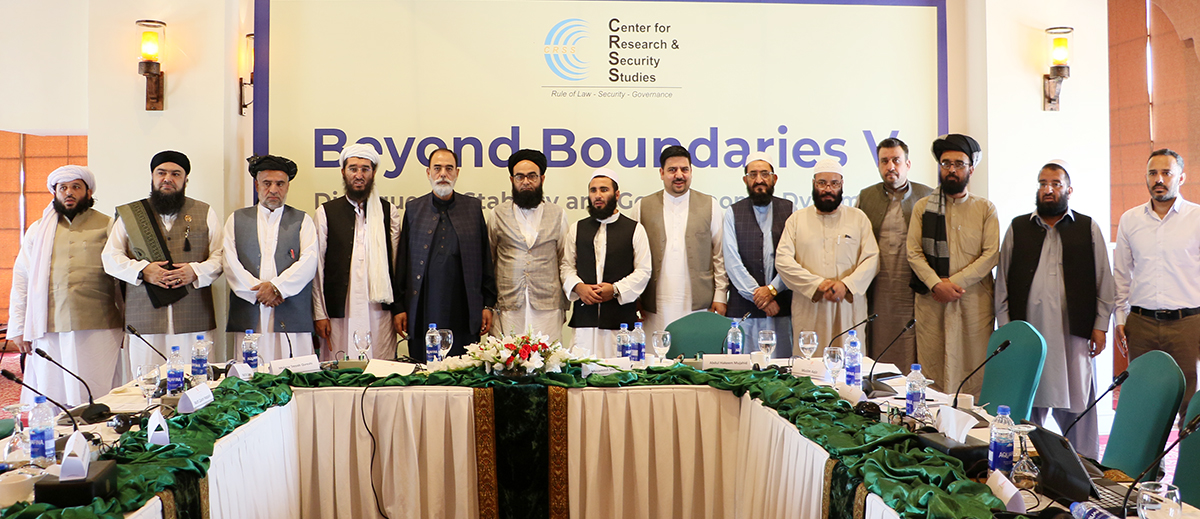The Pak-Afghan Dialogue on Stability and Geo-economic Dynamics was organized by the Center for Research and Security Studies (CRSS), in collaboration with its Afghan partner Organization for Economic Studies and Peace (OESP), where 18 participating religious scholars (male and female), tribal representatives, and commerce experts from both countries discussed and proposed pragmatic solutions for addressing bilateral issues concerning economic development, peace, and security, as well as the humanitarian and human rights situation in Afghanistan.
CRITICAL ANALYSIS
The dialogue provides a contextual understanding of the challenges and opportunities faced by Afghanistan and Pakistan. The discussions on girls’ education and women’s rights underscore the urgent need to address gender inequalities for societal progress. Additionally, stakeholders on both sides deem trade and economic connectivity as core pillars of regional stability. Inclusive decision-making and a system of governance are the key to fostering stability and geo-economic progress. Participants also opine that religious and cultural similarities are the strength of both countries and must be utilized and promoted to build stronger bilateral ties.
Regional collaboration and partnerships can create opportunities for economic growth, but it is essential to ensure that such endeavors prioritize the welfare of both nations and promote sustainable development.
In Afghanistan, reduced corruption and relatively stable law and order situation is seen as a positive development, but ISIS is still a threat. Despite making considerable economic progress, Afghanistan’s fiscal stability remains vulnerable. Taliban’s claims of a zero-tolerance policy against terrorism are not seen translating into action for the neighbors, especially Pakistan, as TTP remains a threat to the country despite several mediations and promises of indefinite ceasefires.
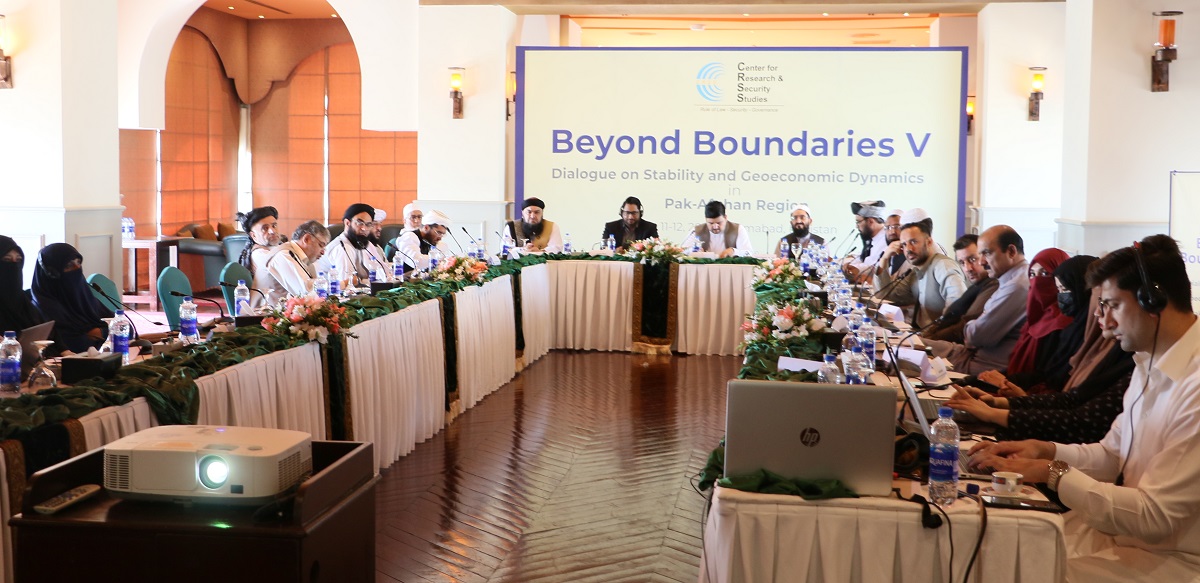
The issues call for a comprehensive approach that emphasizes human rights, gender equality, socio-economic progress, and peace on both sides while fostering dialogue and cooperation for regional stability and prosperity.
SENSE OF MEETING
The discussions during the dialogue reflected a collective view of the challenges and opportunities in Afghanistan. Participants emphasized the need to address urgent issues, particularly focusing on resolving the state of girls’ education and lifting work bans imposed on women. They underscored the significance of taking immediate action to resolve these matters.
The forum stressed the urgent need to reopen girls’ schools in Afghanistan, highlighting the importance of providing access to education for all and ensuring their rights to learn and develop. Participants recognized that investing in girls’ education is crucial for empowering and progressing Afghan society as a whole.
Additionally, participants emphasized the pressing need to lift work bans on women. They called for creating opportunities that enable women to participate in the workforce, contributing to the country’s economic development and fostering gender equality. Participants emphasized the importance of ensuring women have access to livelihoods and can exercise their rights to work and support themselves and their families.
Regarding trade and economic connectivity, participants expressed positive sentiments toward the new barter trade system and the progress made on the TAPI pipeline project. They viewed these developments as promising steps toward enhancing economic connectivity and facilitating trade with neighboring countries. Furthermore, participants highlighted the deal between the Taliban and a Chinese company for oil extraction as a potential source of economic growth and stability, offering opportunities for job creation, revenue generation, and the effective utilization of Afghanistan’s natural resources.
Lastly, terrorism and economic challenges were deemed as common threats to the region.
The dialogue concluded with key recommendations aimed at fostering regional stability and geoeconomic dynamics. These recommendations (depicted below in detail) called for the promotion of peace, security, and good governance in the region; equal opportunities for education and accessible healthcare facilities especially in the border regions; and increased bilateral trade and economic cooperation between Afghanistan and Pakistan.
RECOMMENDATIONS
1) Women’s Rights, Girls’ Education, and Healthcare
- Girls’ schools and educational institutions in Afghanistan should be reopened to ensure access to education for all girls.
- Assistance should be sought from established Islamic educational institutions, such as those in Saudi Arabia and Pakistan, to ensure that girls’ education adheres to Islamic standards.
- Islamic education should be promoted and normalized, providing girls and women with knowledge about their rights under Shariah and enabling them to advocate for their legal rights.
- Distant learning programs should be established to overcome barriers to education, particularly for girls residing in remote areas.
- Regular communication channels between the stakeholders and Taliban authorities should be facilitated through foreign offices to address concerns related to girls’ education effectively.
- Subsequent meetings and discussions should be held in Kabul and Qandahar to engage with local stakeholders and ensure a comprehensive approach to addressing women’s rights and girls’ education. − Adequate health facilities, especially maternity wards, should be established in the border areas. Doctors from the border areas of Afghanistan should be given capacity-building training by their Pakistani counterparts and health experts.
2) Trade and Economic Connectivity
- Regional collaboration and partnerships between Afghanistan, Pakistan, and other countries should be fostered to enhance trade and economic connectivity.
- Investment in Afghanistan’s mining industry should be encouraged by incentivizing Pakistani engineers to participate in the development and growth of the sector.
- Economic ties and agreements, particularly with China and other regional countries, should be strengthened to leverage Afghanistan’s abundant natural resources for mutual benefit.
- Vocational training programs and skill development initiatives should be commenced by Pakistan, the international community, and INGOs/NGOS to enhance the capacity and productivity of the workforce in Afghanistan.
- Knowledge and technology transfer between Pakistan and Afghanistan should be facilitated to promote sustainable economic growth and development.
3) Rule of Law, Governance, and Peace and Security
- Unemployment and livelihood issues in Afghanistan should be addressed to ensure the sustainability of peace in the region. Initiatives that generate employment opportunities and promote economic growth should be implemented.
- IEA should repatriate experts from previous governments so the country can rebuild itself. This will also help the de facto government establish goodwill with the people, even with the opposition groups
- Cross-border commute facilitation for border natives should be improved to foster cultural, social, and economic connectivity between Afghanistan and Pakistan.
- Advocacy for the recognition of the Afghan government and its diplomatic stature internationally should be undertaken to enhance Afghanistan’s representation in the global community.
- Bilateral cooperation in the field of security and counter-terrorism should be strengthened to maintain peace and stability in the region.
- Platforms for regular dialogue and consultation among relevant stakeholders should be established to address ongoing security challenges and promote effective conflict resolution mechanisms.
EVENT SUMMARY:
FIRST SESSION
Current State of Human Rights in Afghanistan: Girls’ Education, Women’s Socioeconomic Inclusion, and Humanitarian Situation
The first session was centered on the state of human rights, girls’ education and women’s right to work, and the humanitarian situation in Afghanistan. Abdul Hakim Mujahid emphasized that “peace has been established to a substantial extent in Afghanistan” and commended the country’s self-sustainability despite facing sanctions. While the Afghan government opposes human rights violations, he acknowledged that the issue of girls’ education needs to be addressed, urging the international community to understand and respect the sovereignty of all countries.
Muslim Aajiz brought attention to the need for schools and workplaces to be open for girls and women, expressing concern for the loss of livelihood experienced by those working in salons (the Taliban have recently banned all beauty salons in Afghanistan). He stated, “If this is non-Islamic, the government should provide an alternate source to them. But there has to be a solution.”
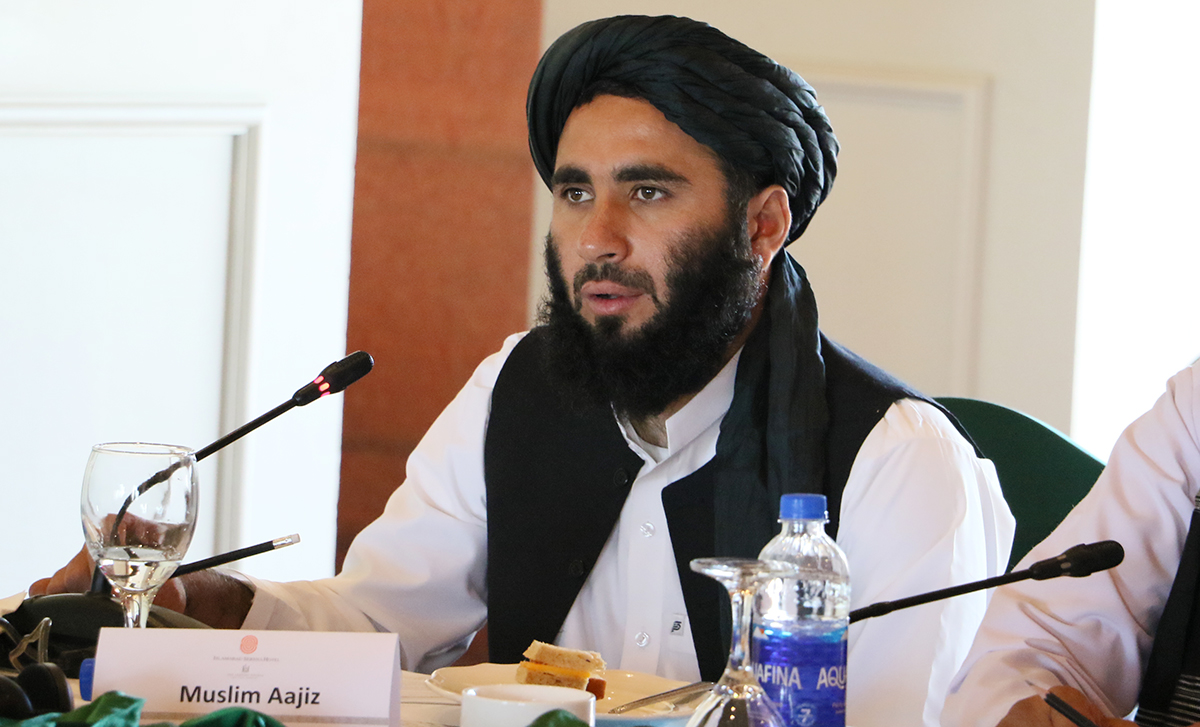
Abdul Wahid Wahid dismissed the notion of circumstances and systems as mere excuses, emphasizing the urgency of reopening schools in Afghanistan. He criticized previous progress made in gender parity as “just to please the West” and expressed dismay over the closure of institutions, stating, “Our children will ask, what sort of Islam is it that shuts down educational institutions.”
Molana Tayyab Qureshi emphasized the importance of unity and cooperation among intellectuals, civil society, and influential individuals in Afghanistan, regardless of their government affiliation. He called for patience, tolerance, and the resolution of differences, highlighting the significance of the forum in addressing the aforementioned concerns. He stated, “Resolving differences requires patience and tolerance. The issue of girls’ schools’ closure has to be resolved by considering all groups’ perspectives.”
Mufti Hussain highlighted the positive changes established by the Taliban, such as reduced corruption, improved economy, and improved state of peace in Afghanistan. He suggested that these positive aspects should be recognized, but also stressed the need to address existing issues. The importance of education as a major impediment to Afghan society’s progress was emphasized, particularly the reopening of girls’ schools, as women and girls constitute half of the population. He stated, “Education is a major impediment to the progress of Afghan society as a whole.”
Mufti Shams ur Rehman Frotan expressed optimism regarding the forum’s potential to yield positive results. He shared his experiences of advocating for girls’ education and women’s rights on a recent television program, stating, “I engaged in a very meaningful debate and kept my focus on girls’ education and women’s rights.” He expressed concerns about a potential trend of violence against women not betrothed to the Taliban and criticized the closure of salons, stating, “Just because men do not require to go to salons, they have ordered to shut them for women.”
Abida Majidi highlighted the concerning fact that girls have been out of school for 700 days and emphasized the urgent need to address the question of girls’ education. She expressed dismay over the fading voices in favor of girls’ education and the repercussions faced by those who speak up, stating, “Voices in favor of girls’ education have faded in the past two years. Those who speak up are arrested or detained.”
Dr. Sajida Jameel emphasized the normalization of Islamic and Quranic education, enabling girls to learn more about their rights under Shariah and gain insight into their legal rights for better advocacy. She also stressed the need to strike a balance by retaining technical subjects as they provide valuable life skills. Jameel highlighted the importance of distant learning programs, utilizing internet connectivity, and emphasized the importance of reaching out to Taliban authorities through foreign offices.” I would like to stress that such fora should be held in Kabul as well – to amplify the efficacy of the discourse and messages”, she concluded.
Abida Majidi brought attention to the dire situation of girls’ education in Afghanistan, stating, “700 days since girls are out of school.” She highlighted the unresolved question of whether girls’ education is allowed or not (in the Taliban’s definition of Shariah), expressing concern over the fading voices in favor of girls’ education in the past two years. Majidi expressed her dismay over the arrests and detentions faced by those who speak up for girls’ education.
Sohaila Haideri drew attention to the concerning statistic that only 10,000 women are working out of a population of 20 million in Afghanistan. She stressed the importance of allowing women to work while practicing purdah (modesty) and urged their participation in the economic workforce to become useful members of society. She emphasized, “Each positive act that benefits humanity is equivalent to a prayer – if we are included in the nation-building, we would be doing a great service to this nation and ummah.”
SECOND SESSION
Regional Economic and Development Challenges and Opportunities
The second session was centered on the economic and development challenges and opportunities in the region. Mozammil Shinwari drew attention to the lack of foreign direct investment (FDI) in Afghanistan and questioned why investors were not coming forward and why the government was not taking up mega projects. He pointed out that while transit issues have been resolved to a great extent, these positive developments alone are not enough. Commenting on the improved but vulnerable state of the economy, he stated, ” The recent budget by the Afghan government was mainly operational budget, national and international investment and external investors’ contribution will help the country stabilize.”
Ibrahim Shams referred to a recent survey that highlighted the uncertainties associated with the new system (of governance). While acknowledging some improvements, Ibrahim expressed concerns raised by traders. He noted that there have been no international or national efforts to boost the confidence of private businesses, and poverty has doubled. Ibrahim highlighted the need to assess whether the common man had been incentivized or provided relief, stating, “The recent survey states that due to the new system, there was a lot of uncertainty, inflation reached up to 48%, in August 2023 the new system will complete 2 years, some aspects and circumstances have improved. The new system should have guaranteed new jobs, but it did not. On the whole, some statistics might be promising, but we need to see if the common man was incentivized or given relief.”
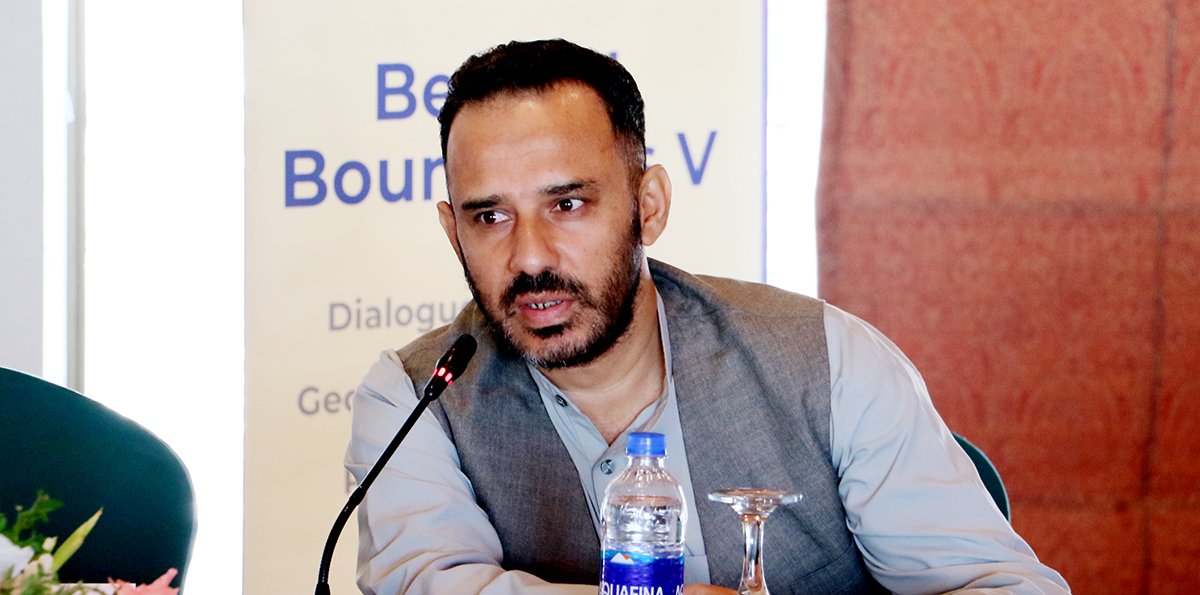
Recognizing the potential of the mining industry and other economic domains, Mozammil Shinwari further emphasized the importance of utilizing the current peace and security situation to boost economic potential. He asserted, “Both countries need mining experts, geologists. There should be a comprehensive policy for the mining industries. If the current peace and security situation is not utilized to boost the potential of the mining industry and other economic domains, then such peace and prosperity is of no use. If people’s lives do not improve, the peace may not last long as it will lead to dismay, malaise, and disintegration in society.”
Emphasizing the need for unity and good governance, Abdul Hakim Mujahid said, “Inclusive govt is the solution to people’s problems. The monopoly of one group/faction will not resolve our issues.”
Abdul Khaliq Achakzai raised concerns about skyrocketing taxes in trade and suggested establishing a policy that includes trade and economic projects with countries like China and the UAE. He also stated that the non-recognition of the Taliban is also a major obstacle in fostering cordial and economic ties with the IEA. “Government in Afghanistan asks that if they are not recognized, how they can make concessions in taxes.”, he asserted.
Underpinning the need to eliminate impediments such as the closure of girls’ schools and ban on women’s work and their implications on the economy in the longer run, Abdul Wahid Wahid said, “We have a fine budget for now, but in the coming months and years, we won’t be able to sustain it. 60% of our income is reduced due to the lack of women’s participation.”
Nasir Dawar, highlighting the impact of unemployment and restricted freedom of assembly and speech, said, “We have a report from June 2022. 286 people have committed suicide due to the regressive practices and lack of human rights in Afghanistan. We spoke to psychiatrists in Kabul. Out of 286 cases of suicide, there were 145 females and 133 males. The past two years have caused great harm to the Afghan young generation, and a lot of progress has been undone.” He added that the major obstacle in the way of socio-economic development in Afghanistan is the lack of educational and occupational opportunities.
THIRD SESSION
Rule of Law, Governance, and Peace and Security
Mozammil Shinwari expressed concern about the increasing incidents of terrorism in Afghanistan and Pakistan and emphasized the need to find viable solutions, saying, “Incidents of terrorism are increasing in Afghanistan and Pakistan in the shape of ISIS and TTP. Both sides share a common threat. This is the time to work together for regional stability and strengthen bilateral ties.”
Abdul Khaliq Achakzai highlighted the cordial ties between Pushtuns on both sides and suggested leveraging these ties to promote peace. However, he acknowledged that the region of Balochistan still faces significant terrorism challenges. He emphasized the importance of dialogue and suggested sending a delegation to Qandahar, stating, “Pushtuns on both sides share cordial ties. These ties should be utilized to promote peace. Our region (Balochistan) is still brimming with terrorism. Talks vis-a-vis resolving these issues remain a deadlock, but we would like to assume that the other side (Taliban) is busy with their internal matters.”
Molana Tayyab Qureshi discussed the importance of unity and peace, citing the Pushto saying, “If we are not united, we would disappear.” He stated, “There is more peace, less corruption, and the economy is improving. A lot of peace is disrupted, and there is disintegration because the right to education has been denied. Women are denied rights in Afghanistan and Pakistan, and Islam is used as an excuse. Participation of women in society and the economy is imperative.”
Mufti M. Qasim expressed his observations on the implementation of Shariah in Afghanistan, pointing out the lack of proper governance and constitution. He also raised concerns about the primitive nature of Pakistan’s constitution, highlighting the need for modernization.
Mufti Qasim Haqqani mentioned elements destabilizing peace and the presence of the TTP in Afghanistan. He commended Afghanistan’s approach of removing the entire cabinet in areas where any element of TTP was found, seeing it as a promising measure.
Shoukatullah Haqqani said, “It’s been 2 years since the fall of Kabul. Many clerics on both sides celebrated it. They saw it as a victory for Islam. But to confirm whether the regime is in sync with Islam, we have to look at its performance. The Afghan people’s primary concern is the economy – that is the real crisis. All the skilled people have left the country. Sadly, now appointments in the government are done based on Jihadist standing, and politics and governance are done based on martyrdom and lineage.” He added that such trends will push Afghanistan towards further regression.
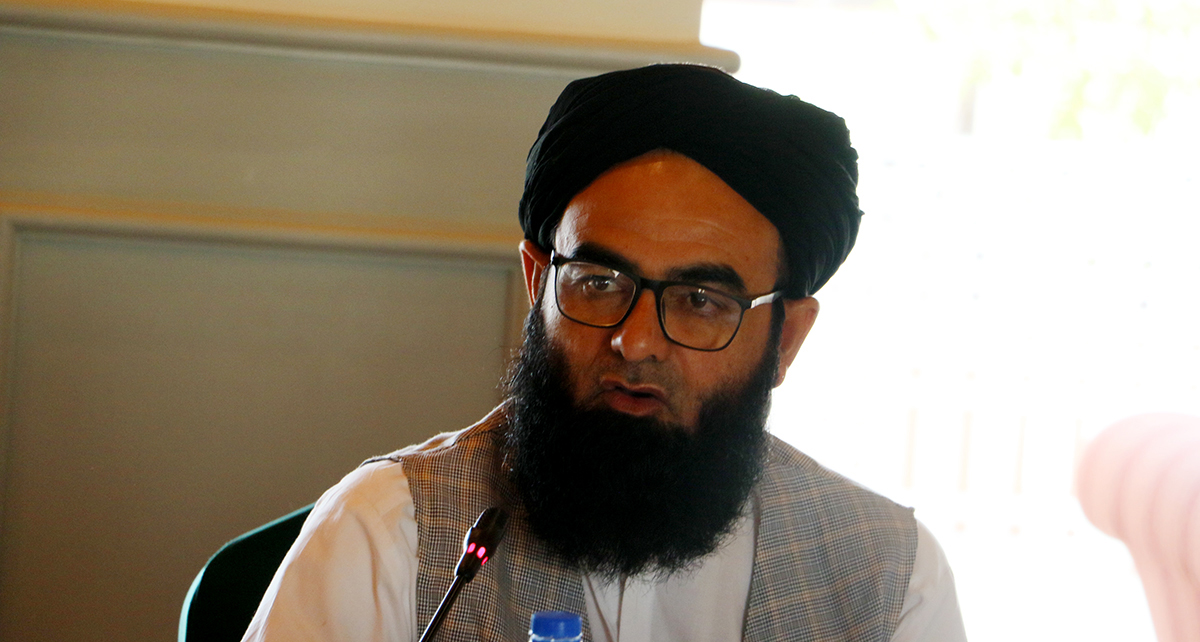
Nasir Dawar emphasized the need for political awareness, activism, and consensus. He compared the situation in Afghanistan to that in Pakistan, where there is political freedom and awareness despite being an Islamic country. He also stressed the importance of working on governance issues and empowering young people to end the war in Afghanistan. “The political rights of Afghans must be restored as political and democratic progress will determine the future of the overall growth of the country”, he added.
The lack of accessible leadership and the importance of compassion and alternatives to banned activities were mentioned. Mozammil Sinwari highlighted the progress made in Afghanistan over the past two decades, such as increased school enrollment and infrastructure development. Key takeaways included incentivizing Afghan experts to return, prioritizing welfare programs, and focusing on youth capacity building and mass employment programs.
Abdul Hafeez Amin commented on the progress of governance in Afghanistan, particularly in terms of maintaining public relations. However, he highlighted the need for competent individuals in the cabinet.
Mufti Muslim Aajiz said, “International media reports that TTP carries the weapons left behind by the US and NATO. Afghanistan has said repeatedly that it would not allow terrorist outfits to operate on its soil. If there are deserted and unruled (by the Taliban) areas, then this cannot be blamed on Afghanistan or the Taliban.” He further stated that Sharia says that rulers should be accessible to people, “But in Afghanistan, we do not see our ruler. He is hidden in 100 layers. This poses a serious concern: leadership is not accessible”, he said
On the existence of ISIS, Aajiz added, “In Qandahar or other regions where Taliban are in majority, there is no ISIS. However, it exists in Nuristan and other regions. Among Salafis, there are 2 groups: ones who are pro-Afghanistan but are militants, and the other group is on the payroll of other countries. “Their existence jeopardizes Afghanistan’s stability.”, he concluded.
On the alleged differences between the Taliban, he further said that the two different groups exist but on media and publicly; both pledge allegiance to the supreme leader Haibatullah Akhunzada.
A representative from the Ministry of foreign affairs (MOFA), Pakistan, also briefed the forum on Pakistan’s efforts in tackling the humanitarian crisis post-Taliban takeover and shared views on the state of law and order, and peace and security in the country. He said that education and healthcare in Afghanistan are Pakistan’s priorities. “We have built hospitals and provided scholarships based on merit to Afghan students. We are committed to increasing the number and quality of scholarships to compensate for the academic losses of the past two years”, he added.
He further said that after the fall of Kabul and the regime change, ISIS and TTP were let loose, causing concern for security in the region. “Daesh is not financed by any country; it is an enemy of both Pakistan and Afghanistan”, he stated. On Pakistan’s rejection of mediation offers, he said that because TTP has different factions, including Noor Wali and Jamat ul Ahrar, who are not on the same page. “As a result, negotiations could not take place, and fruitful results were unlikely”.
He also highlighted Pakistan’s assistance to Afghans who have sought refuge in the country after the Taliban takeover. “Around the world, visa restrictions have been in place for the destitute Afghans since the fall of Kabul. Only Pakistan and Iran granted visas and kept their doors open, while Turkey and Europe did not. This also badly affected students’ academic careers who had to go abroad on study visas”. He further said that around 92,000 people came to Pakistan on transit visas to go to other countries, like the US and Canada, seeking refuge. “Despite spending 1.5 years in Pakistan, their visa issuance is still pending, highlighting the burden on the host nation.”, he concluded.
Based on his visits to Afghanistan after the Taliban takeover, he recalled that there are disparities among each district/province’s police in Afghanistan, indicating a lack of communication between local police and the government. Incompetence on check posts is evident, with issues in dealing with diplomats and the general public, including difficulties in reading documents. “Proper education and training are necessary to address these challenges effectively.”, he suggested.
KEYNOTE ADDRESS BY TALHA MEHMOOD, MINISTER FOR RELIGIOUS AFFAIRS AND INTERFAITH HARMONY
Pakistan’s Federal Minister for Religious Affairs and Interfaith Harmony, Senator Muhammad Talha Mahmood, delivered a keynote address in which he highlighted the importance of bilateral cooperation between Afghanistan and Pakistan, particularly in trade and economic connectivity. He said that Pakistan and Afghanistan should synergetically pursue the shared socio-economic and political development goals and create stakes for standing by each other through thick and thin.
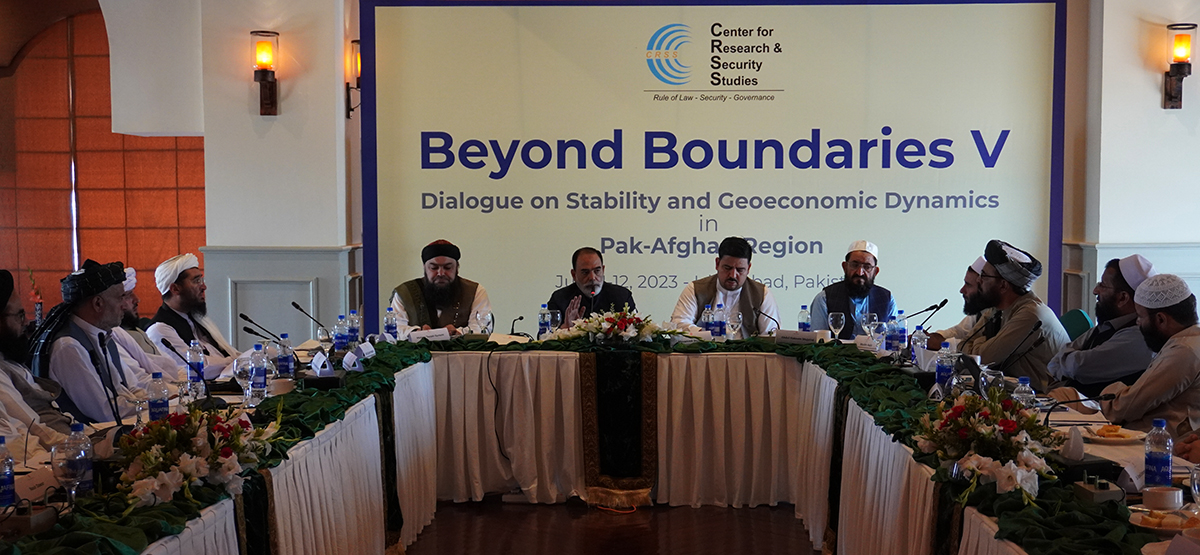
“Trade and economic connectivity are our priorities, and collaboration in these mutually beneficial areas of relationship can incentivize both nations tremendously and help them attain prosperity, and stability, and strengthen regional connectivity. People-to-people ties determine all other areas of the bilateral relationship. Therefore, we must strive to bring both peoples closer; building on the commonalities like culture, religion, etc. “, he added. The minister concluded that the potential of the formal and informal diplomacy channels must be harnessed to address common misperceptions, differences, and challenges.
CONCLUSION
The two-day dialogue provided an essential platform for stakeholders from Afghanistan and Pakistan to engage in constructive discussions on pressing issues affecting both nations. Furthermore, this engagement has unveiled a notable phenomenon wherein the participants particularly Afghan religious scholars have taken ownership of the Beyond Boundaries initiative, recognizing it as a credible platform to articulate their concerns. Consequently, there has been an observable positive shift in their behavioral patterns concerning their demands regarding girls’ education and right to work. Moving forward, implementing the recommendations put forth during the dialogue will be crucial in realizing the vision of a stable and prosperous region, where both countries can collaborate to address shared challenges and identify and capitalize on opportunities for economic growth and development. Besides, the collective views and acquiescence of religious and tribal representatives, and business experts from both sides on the issue of girls’ education and women’s right to work marks an auspicious and welcoming mood as far as the advocacy on these issues is concerned. Hence, the stakeholders’ sustained commitment to fostering regional connectivity, socioeconomic development, and people-to-people ties is essential and will play a pivotal role in overcoming misperceptions and building a strong foundation for lasting cooperation between Afghanistan and Pakistan.